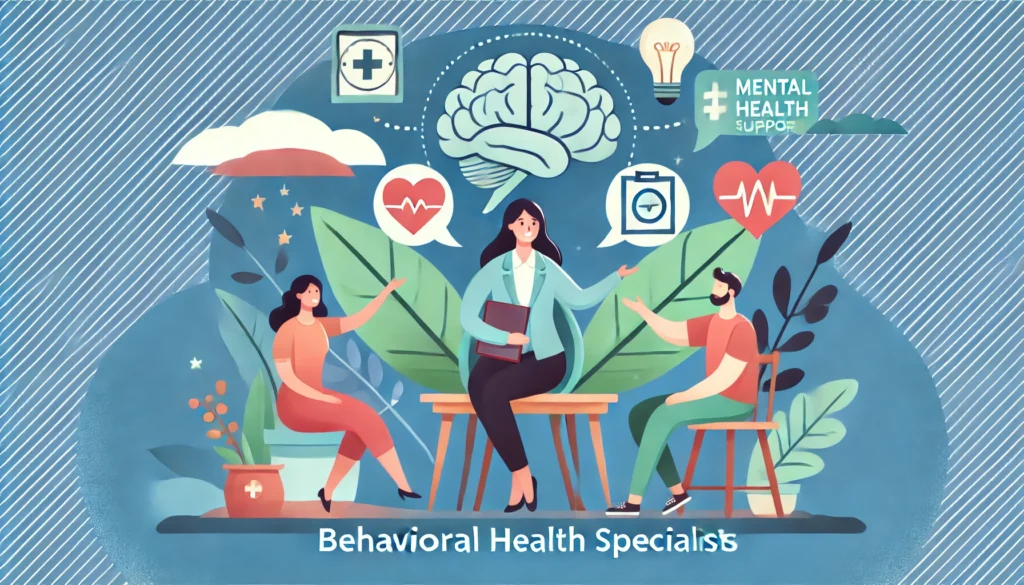In a world where mental health is increasingly recognized as a cornerstone of overall well-being, behavioral health specialists have emerged as vital allies in helping individuals navigate life’s challenges. These professionals are trained to address a wide range of emotional, psychological, and behavioral issues, empowering people to lead healthier, more fulfilling lives. Whether it’s managing anxiety, overcoming addiction, or healing from trauma, behavioral health specialists provide the tools and support needed to foster resilience and growth. This article delves into the role of a behavioral health specialist, the challenges they help individuals overcome, and how their work transforms lives.
Who is a Behavioral Health Specialist?
A behavioral health specialist is a trained professional who focuses on the connection between behaviors, emotions, and mental health. They work with individuals to identify and address issues that impact their well-being, such as stress, anxiety, depression, addiction, and trauma. These specialists may include psychologists, licensed clinical social workers, counselors, and therapists, each bringing unique expertise to their practice.
Behavioral health specialists are equipped to handle a variety of challenges, including:
- Anxiety and depression
- Substance abuse and addiction
- Trauma and post-traumatic stress disorder (PTSD)
- Relationship and family conflicts
- Stress management and burnout
- Behavioral disorders in children and adolescents
Their primary goal is to provide a safe, non-judgmental space for individuals to explore their thoughts and feelings while equipping them with practical strategies to manage their challenges effectively.
The Role of a Behavioral Health Specialist
Behavioral health specialists play a multifaceted role in supporting individuals on their journey to mental and emotional well-being. Their responsibilities include:
- Assessment and Diagnosis
Behavioral health specialists begin by conducting thorough evaluations to understand the root causes of a client’s struggles. This may involve interviews, questionnaires, and collaboration with other healthcare providers to gather a comprehensive picture of the individual’s mental health. - Personalized Treatment Plans
Based on their assessment, behavioral health specialists create tailored treatment plans that address the unique needs of each individual. These plans may include therapy, medication management, lifestyle changes, or referrals to other specialists. - Therapy and Counseling
One of the most significant aspects of their work is providing therapy. They use evidence-based approaches such as cognitive-behavioral therapy (CBT), dialectical behavior therapy (DBT), and mindfulness techniques to help clients reframe negative thoughts and develop healthier behaviors. - Crisis Intervention
Behavioral health specialists are often called upon to provide immediate support during crises, such as suicidal ideation, severe anxiety attacks, or traumatic events. Their ability to remain calm and provide effective interventions can be life-saving. - Education and Prevention
They educate clients and communities about mental health, helping to reduce stigma and promote early intervention. Prevention programs may focus on stress management, substance abuse prevention, and building emotional resilience. - Advocacy and Support
These specialists advocate for their clients’ needs, whether it’s navigating the healthcare system, accessing resources, or addressing social determinants of health. They work to ensure that individuals receive the care and support they need to thrive.
How Behavioral Health Specialists Empower Individuals

The journey to mental and emotional well-being is not always easy, but behavioral health specialists provide the guidance and support needed to overcome challenges. Here’s how they empower individuals:
- Building Self-Awareness
Through therapy and counseling, behavioral health specialists help individuals gain insight into their thoughts, emotions, and behaviors. This self-awareness is the first step toward positive change. - Developing Coping Skills
They teach practical strategies for managing stress, anxiety, and other challenges. These skills empower individuals to handle difficult situations with confidence and resilience. - Fostering Emotional Resilience
By addressing past traumas and negative thought patterns, behavioral health specialists help clients build emotional strength and adaptability. - Encouraging Healthy Relationships
They work with individuals and families to improve communication, resolve conflicts, and build stronger, more supportive relationships. - Promoting Long-Term Well-being
Behavioral health specialists focus on sustainable solutions, helping clients create habits and routines that support their mental and emotional health over time.
Challenges Addressed by Behavioral Health Specialists
Behavioral health specialists are trained to address a wide range of challenges, including:
- Mental Health Disorders
Conditions like anxiety, depression, bipolar disorder, and schizophrenia can significantly impact a person’s life. Behavioral health specialists provide the tools and support needed to manage these conditions effectively. - Substance Abuse and Addiction
Addiction is a complex issue that often requires a combination of therapy, medication, and lifestyle changes. Behavioral health specialists help individuals break free from the cycle of addiction and rebuild their lives. - Trauma and PTSD
Traumatic experiences can leave lasting emotional scars. Behavioral health specialists use trauma-informed care to help clients process their experiences and heal. - Stress and Burnout
Chronic stress and burnout can take a toll on mental and physical health. Specialists help individuals identify stressors and develop strategies to manage them. - Behavioral Issues in Children and Teens
Children and adolescents may struggle with behavioral issues, ADHD, or emotional regulation.
FAQs
- What qualifications does a behavioral health specialist have?
Behavioral health specialists typically hold advanced degrees in psychology, social work, counseling, or a related field. They are also licensed to practice in their state and may have additional certifications in specific therapies or areas of expertise. - How do I know if I need to see a behavioral health specialist?
If you’re experiencing persistent feelings of sadness, anxiety, or stress, struggling with relationships, or facing challenges like substance abuse or trauma, a behavioral health specialist can help. They provide support for a wide range of mental and emotional issues. - What happens during the first session with a behavioral health specialist?
The first session typically involves an assessment where the specialist asks about your concerns, medical history, and goals. - Is therapy confidential?
Yes, therapy sessions are confidential. Behavioral health specialists are bound by ethical guidelines to protect your privacy, except in cases where there is a risk of harm to yourself or others.


